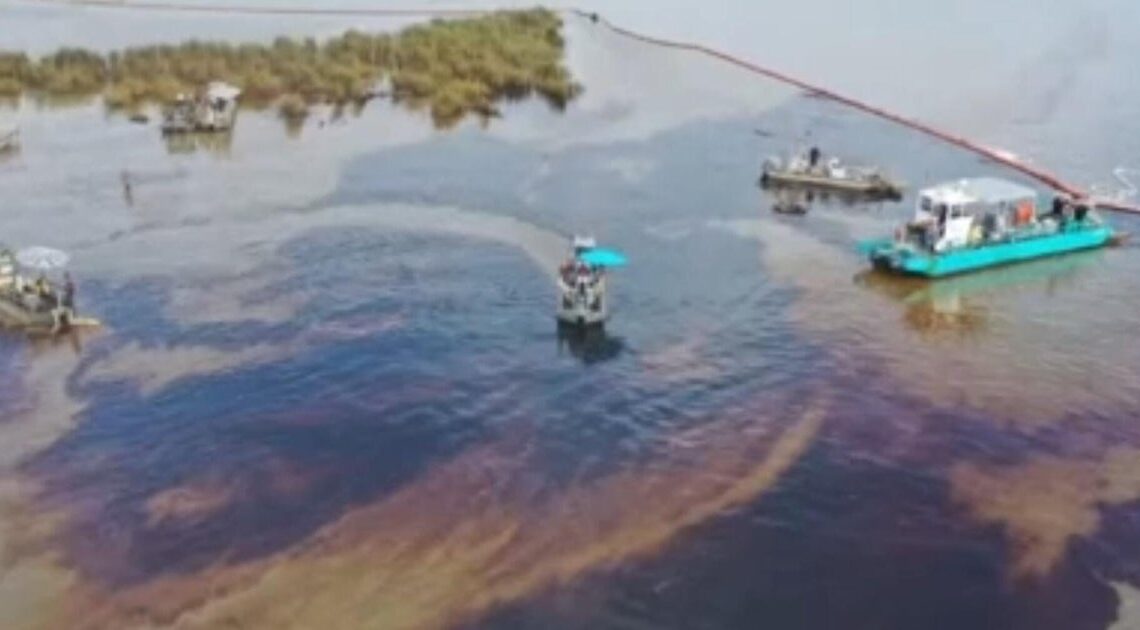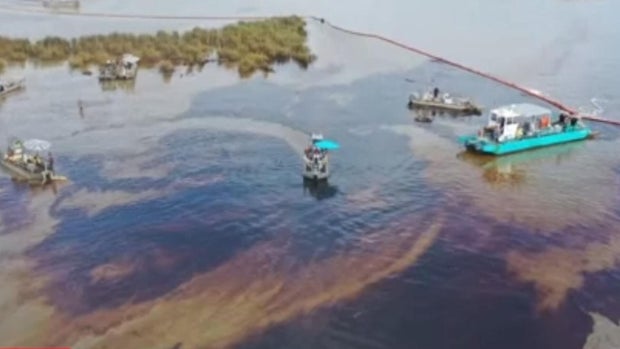
Oil spill off Louisiana’s Gulf Coast raises alarm as DOGE cuts may threaten response efforts
3. May 2025
Former federal disaster response specialists and national environmental groups warn that DOGE job cuts may hamper the response to a major oil spill off Louisiana’s Gulf Coast this week, a leak that is fast contaminating marshlands and threatening vital wildlife habitats and fisheries.
Although the amount of crude oil currently leaking out of the well is not yet known, a report from the U.S. Coast Guard’s National Response Center earlier this week said “the amount discharged could potentially reach the threshold of a major spill for coastal waters (over 100,000 gallons).” The leak was first reported on Friday, April 26, as a “well blowout.” The cause is not yet known.
On Thursday, the Coast Guard reported more than 30,000 gallons of an “oily watery mixture” had been collected from the spill site, and while more than two miles of booms had already been deployed, crews were waiting for more containment materials to arrive.
More than 1,000 employees of the National Oceanic and Atmospheric Administration were laid off or have taken early retirement in recent days. That is in addition to around 1,000 that were cut earlier this year, according to sources familiar with the reduction in forces. This week eight of 28 staff members from NOAA’s Office of Response and Restoration Emergency Response Division — the very team tasked with addressing the oil spill — left the agency.
The office handles approximately 150 oil and chemical spills annually. Its core mission is to answer the following questions: .
- What was spilled?
- Where will it go?
- What will it impact?
- What damage will it cause?
- How can the effects be mitigated?
According to NOAA, the office has helped recover $10.8 billion from responsible parties over the past three decades to support environmental restoration.
A recently retired NOAA senior manager involved in spill responses told CBS News that the agency has undergone “substantial reductions” in the team that provides scientific support to the Coast Guard, which is currently in charge of coordinating operations, and is the lead agency investigating the cause of the spill in Garden Island Bay.
Adriana Bejarano until this week was a chemical scientist in that Emergency Response Division and was let go because of her probationary status. Although Bejarano had been in the job for under a year, she was previously a senior eco-toxicologist at Shell Oil who holds a Ph.D. and had been in this field of work for 20 years.
“If this continues and other disasters happen at the same time, I don’t think NOAA will have the expertise or personnel to respond,” Bejarano told CBS News.
Gib Brogan, who is with the nonprofit group Oceana, told CBS News that the equivalent of “27,000 years of NOAA experience are walking out the door this week with early retirement.”
“We are very concerned about staff and expertise that won’t be able to respond to this oil spill,” Brogan said. “No part of NOAA has been spared from DOGE and early retirements, we know the expertise is not there and the support from the agency and the support isn’t there for the responses.”
Currently, what has been described by witnesses as a geyser of oil is shooting 30 to 40 feet into the air from a well operated by Spectrum Opco LLC. Clean-up crews have been spraying the airborne oil with water to push it back to the surface to more easily collect it, and prevent the oil from drifting further away from the spill site.
The well, known as Well 59, was drilled in 1942 to a depth of nearly 7,000 feet and has changed ownership multiple times. It was capped in 2016 and has not been operational since then, the Coast Guard said. But according to Scott Eustis of Healthy Gulf, a nonprofit that monitors the health of the region and advocates for moving away from oil and gas extraction, it should have been plugged a decade ago. That’s a process that involves injecting concrete into the well to permanently seal it off.
The leaked oil appears to have reached critical habitats, including areas used by the threatened loggerhead sea turtle, although no harm to wildlife has been reported.
U.S. Coast Guard
This incident is part of a larger issue that has concerned experts for years: a study in 2023 identified 14,000 unplugged, abandoned wells in the Gulf. Meanwhile, the Trump administration has pushed to expand offshore oil drilling and accelerate the permitting process, reducing timelines to just weeks.
The leak is occurring near the Garden Island Bay area of the Pass-a-Loutre Wildlife Management Area, a sensitive ecological zone in southeastern Louisiana.
According to Eustis the spill threatens a range of species including black terns, bottlenose dolphins, larval yellowfin tuna, marsh birds, spring pogies, and young fish migrating into the estuaries for spring growth.
There are also potential threats to the region’s shrimp industry, with the shrimping season scheduled to start in just a couple of weeks, including in the marsh where the spill is still actively spraying.
The Coast Guard announced yesterday that response efforts have been “federalized,” allowing federal agencies to take full control of the containment and cleanup operation. A capping stack and other well control equipment were en route on Thursday.
An update on operations Thursday said that 32,718 gallons of oily water mixture had been recovered.
“We’re currently still actively using 12 skimmers on site,” said Coast Guard Captain Gregory Callaghan, the man in charge of coordinating the multi-agency response efforts to the Well 59 leak, in an interview with CBS News. “I’d say one of the unique things about this incident is its location… a pretty remote area in the marshes. That it does make it difficult to get to… [and] to stage resources.”
CBS News reached out to Spectrum Energy, a Houston-based firm with overlapping leadership with Spectrum Opco, and the company referred inquiries to a Gmail account being used by the Coast Guard for coordination.
Asked about whether he was concerned that federal spending cuts were impacting his teams’ response, Callaghan said, “I would say no from the federal agency coordinator role. Our goal is to utilize all resources necessary to get this source controlled and then take every mitigating, uh, effort we can to, uh, respond to the environmental impacts.
A spokesperson for NOAA told CBS News the agency would not comment on personnel or management matters, but said NOAA “remains dedicated to its mission, providing timely information, research, and resources that serve the American public and ensure our nation’s environmental and economic resilience.”
“We continue to provide oil spill information, trajectory forecasts and other scientific analysis pursuant to our public safety mission,” the spokesperson said.
CBS News has also reached out the White House for comment and has not received a response.
This week marked 15 years since the Deepwater Horizon explosion that led to the discharge of 134 million gallons of oil into the Gulf.
contributed to this report.
